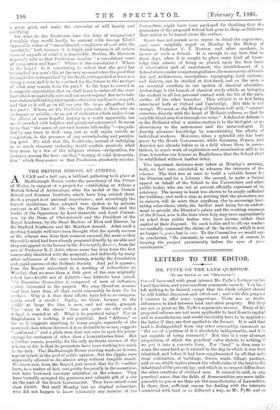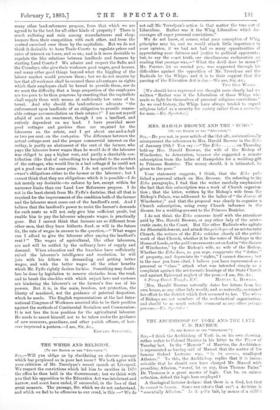LETTER: , TO THE EDITOR.
•
MR. FYFFE ON THE LAND QUESTION.
[TO THE EDITOR OF THE " SPECTATOR." j
have read with great interest Mr. Fyffe's Lecture on the Land Question, and your excellent comments upon it. You have left nothing to be desired, except that the whole subject should be still further discussed and sifted-out ; and with this purpose I venture to offer some suggestions. There are, no doubt, differences in kind between land and other property. But they are not so great as Mr. Fyffe's arguments assume. Many of his proposed reforms are not more applicable to land than to capital and to manufactures, and would inevitably have to be applied to the latter if they are first applied to the former. It is said that land is distinguished from any other commodity, inasmuch as " the use of a portion of it is absolutely indispensable, and it is not capable of being increased." But this is a very abstract proposition, of which the practical value shriuks to nothing if we put it into a concrete form. For " land " is then seen to mean the mere land as it existed in the day in which it was first inhabited, and before it had been supplemented by all that artificial cultivation, of buildings, fences, roads, tillage, pasture, and so on, which makes almost the whole value of the land to the inhabitant of the present day, and which in no respect differs from the other creations of civilised men. It cannot be said, in any practical sense, that the fields of Somersetshire are more indispensable to you or me than are the manufactories of Lancashire. Is there, then, sufficient reason for dealing with the interests connected with land in so different a way, as Mr. Fyffe and so
many other land-reformers propose, from that which we are agreed to be the best for all other kinds of property ? There is much suffering and ruin among manufacturers and shopkeepers from their competition with each other, and from the -control exercised over them by the capitalists. But we do not think it desirable to have Trade Courts to regulate prices and rates of interest on loans, and so on ; and is it more desirable to regulate the like relations between landlords and farmers by starting Land Courts ? We admire and respect the Salts and the Crossleys, who give their workmen good wages, good houses, and many other good things beyond what the higgling of the labour market would procure them ; but we do not require by law that all workmen shall be secured these advantages as rights which their employers shall be bound to provide them, nor do we meet the difficulty that a large proportion of the employers are too poor to be thus generous. by enacting that the capitalists shall supply them with means at sufficiently low rates of interest. And why should the land-reformer advocate "the enforcement upon landlords of an obligation to provide reasonable cottage accommodation on their estates ?" I am not myself afraid of such an enactment, though 1 am a landlord, and entirely dependent on my land. I have provided more good cottages and gardens than are required for the labourers on the estate, and I get about one.and-a-half or two per cent. on the cost-price. The difference between the actual cottage-rent and the proper commercial interest on the outlay, is partly an abatement of the rent of the farmer, who pays the labourer lower wages than he would do if the labourer was obliged to pay a higher rent, and partly a charitable contribution (like that of subscribing to a hospital) to the comfort of the cottager, who would live in a bad cottage if he could not get a good one at the same price. I do not question the landowner's obligations either to the farmer or the labourer ; but I cannot think that they are obligations which it is possible—I do not merely say desirable—to enforce by law, except within far narrower limits than our Land Law Reformers propose. I do not in the least shrink from Mr. Fyffe's doctrine, that all that is required for the improvement of the condition both of the farmer and the labourer must come out of the landlord's rent. And I believe that the landlord's power to resist the farmer's demands for such rents as will not only give him sufficient profit, but enable him to pay the labourer adequate wages, is practically gone. But I cannot think that farmers are so different from other men, that they have hitherto fixed, or will in the future fix, the rate of wages in answer to the question,—" What wages can I afford to give the labourer after paying the landlord's rent ? " The wages of agricultural, like other labourers, are and will be settled by the ordinary laws of supply and demand. When education and the franchise have sufficiently raised the labourer's intelligence and resolution, he will join with his fellows in demanding and getting better wages, and with the better wages all the other benefits which Mr. Fyffe rightly desires for him. Something may doubtless be done by legislation to remove obstacles from the road, and to break the shackles with which unjust laws and customs are hindering the labourer's or the farmer's free use of his powers. But it is, in the main, freedom, not protection, the liberty of manhood, not the guidance of paternal despotism. which he needs. The English representatives at the last International Congress of Workmen asserted this to be their position against the methods of Continental Socialism and Communism. It is not less the true position for the agricultural labourer. He needs to assert himself, not to be taken under the guidance of new overseers, guardians, and other parish officers, of however improved a pattern.—I am, Sir, &c.,
EDWARD STR ACHEY.



































 Previous page
Previous page